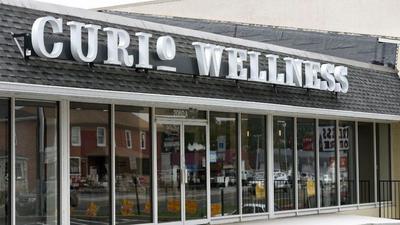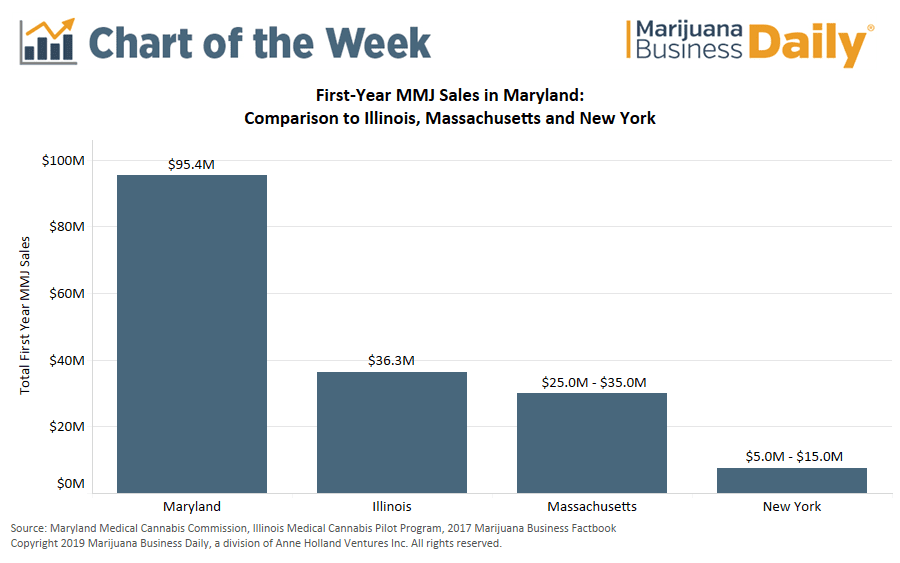Baron23
Well-Known Member
Related article from today
Marijuana monopolies? Maryland medical pot regulators plan hearing on rules many fear threaten competition
State regulators have scheduled a public hearing to address concerns that national cannabis corporations are trying to dominate Maryland’s medical marijuana market by skirting rules designed to prevent a few firms from controlling the burgeoning industry.
The Maryland Medical Cannabis Commission announced that its policy committee will host an open meeting about ownership rules on Jan. 8 — a day before the General Assembly is set to begin a new legislative session expected to tackle the same issue.
The Baltimore Sun reported last month that several national cannabis companies are poised to acquire firms with Maryland licenses despite state rules that limit such consolidation and a state law barring ownership changes for another year.
For instance, Massachusetts-based Curaleaf, which has two of its own licenses in Maryland, has offered $30 million to acquire a small Frederick County company authorized to grow, process and sell cannabis. Other large national companies also have pending deals for Maryland firms, The Sun’s investigation found. The cannabis commission was unaware of three of the deals until notified by The Sun
Several companies moving to enter the Maryland market have structured takeover bids as “management agreements” that give them nearly all of the revenues, while trying not to run afoul of rules limiting how many licenses one company can own.
Maryland regulations allow companies to hold one license in each of the state’s three categories — growing pot, processing it into products and selling them from retail stores.
Some lawmakers and industry representatives are concerned that well-financed, out-of-state cannabis companies seeking to acquire controlling stakes in firms with Maryland licenses could build farm-to-patient monopolies in certain parts of the state that would drive down prices. Such a scenario could cripple independent firms and limit customer access to affordable products.
“There is a fear in the industry about the monopolization of the market by out-of-state companies,” said Mackie Barch, chairman of the Maryland Wholesale Medical Cannabis Trade Association. “The commission is under pressure to clarify what the rules are.”
The commission’s meeting, scheduled for 1 p.m. at the University of Maryland’s law school in Baltimore, will consider “issues of ownership and third-party management services agreements” and seek “feedback and recommendations,” the announcement said. The panel said it is seeking to “clarify the legal requirements” for medical cannabis businesses. Written comments and oral testimony will be accepted from anyone in attendance.
In its announcement, the panel acknowledged that the management agreements may not violate Maryland rules as written if such deals do not involve a transfer of ownership, or equity interest, in the license-holding company. “Depending on their precise terms, management agreements may not constitute a restricted transfer of interest” under state law and regulations, the panel said.
State Dels. Cheryl Glenn and Sandy Rosenberg, both Baltimore Democrats, have said they intend to look at the state’s rules on the matter in the coming General Assembly session, saying the legislative intent was to allow for small businesses to thrive in the industry.
The medical cannabis commission governs an industry that has generated $96 million in its first 12 months of operations. The panel says it has rejected at least six management agreements submitted for approval because the deals violated the regulations and a state law that prohibits sales until at least next December.
A recent opinion provided to Rosenberg by the attorney general’s office said that state regulations do not permit companies “unlimited vertical integration” — owning multiple licenses to grow marijuana, make it into products and sell it. Allowing such a framework could “put smaller operations out of business and risks the creation of monopolies,” the opinion states.

Dr. Michael F. Chiaramonte, president of the Maryland Medical Dispensary Association and the owner of Haven dispensary in Brandywine, said the question “comes down to control.”
“This issue has gone on for a while and we appreciate the commission providing clarity,” said Chiaramonte, whose group represents more than 70 dispensaries in Maryland. “If management agreements are okay, then technically one company could have a management agreement with every dispensary in the state. Is that good for Maryland? Is that good for patients in Maryland?”
The goal, he added, “is to have 102 viable and successful dispensaries across Maryland to ensure patient access.”
Last month The Sun reported several deals that would give well-financed companies trading on the Canadian Securities Exchange control over multiple licenses in Maryland.
Massachusetts-based Curaleaf holds one license to sell medical cannabis from a Reisterstown store and one to make products in Allegany County. In an Oct. 26 filing with the Canadian exchange, Curaleaf reported that it has entered into a $30 million “purchase agreement” to acquire a Frederick County firm that holds three more licenses and a fourth through an affiliate.
The deal also shed light on how companies view management agreements: Curaleaf states in the document that it controls new companies either “through the purchase of the business or control through a management agreement.”
Marijuana monopolies? Maryland medical pot regulators plan hearing on rules many fear threaten competition
State regulators have scheduled a public hearing to address concerns that national cannabis corporations are trying to dominate Maryland’s medical marijuana market by skirting rules designed to prevent a few firms from controlling the burgeoning industry.
The Maryland Medical Cannabis Commission announced that its policy committee will host an open meeting about ownership rules on Jan. 8 — a day before the General Assembly is set to begin a new legislative session expected to tackle the same issue.
The Baltimore Sun reported last month that several national cannabis companies are poised to acquire firms with Maryland licenses despite state rules that limit such consolidation and a state law barring ownership changes for another year.
For instance, Massachusetts-based Curaleaf, which has two of its own licenses in Maryland, has offered $30 million to acquire a small Frederick County company authorized to grow, process and sell cannabis. Other large national companies also have pending deals for Maryland firms, The Sun’s investigation found. The cannabis commission was unaware of three of the deals until notified by The Sun
Several companies moving to enter the Maryland market have structured takeover bids as “management agreements” that give them nearly all of the revenues, while trying not to run afoul of rules limiting how many licenses one company can own.
Maryland regulations allow companies to hold one license in each of the state’s three categories — growing pot, processing it into products and selling them from retail stores.
Some lawmakers and industry representatives are concerned that well-financed, out-of-state cannabis companies seeking to acquire controlling stakes in firms with Maryland licenses could build farm-to-patient monopolies in certain parts of the state that would drive down prices. Such a scenario could cripple independent firms and limit customer access to affordable products.
“There is a fear in the industry about the monopolization of the market by out-of-state companies,” said Mackie Barch, chairman of the Maryland Wholesale Medical Cannabis Trade Association. “The commission is under pressure to clarify what the rules are.”
The commission’s meeting, scheduled for 1 p.m. at the University of Maryland’s law school in Baltimore, will consider “issues of ownership and third-party management services agreements” and seek “feedback and recommendations,” the announcement said. The panel said it is seeking to “clarify the legal requirements” for medical cannabis businesses. Written comments and oral testimony will be accepted from anyone in attendance.
In its announcement, the panel acknowledged that the management agreements may not violate Maryland rules as written if such deals do not involve a transfer of ownership, or equity interest, in the license-holding company. “Depending on their precise terms, management agreements may not constitute a restricted transfer of interest” under state law and regulations, the panel said.
State Dels. Cheryl Glenn and Sandy Rosenberg, both Baltimore Democrats, have said they intend to look at the state’s rules on the matter in the coming General Assembly session, saying the legislative intent was to allow for small businesses to thrive in the industry.
The medical cannabis commission governs an industry that has generated $96 million in its first 12 months of operations. The panel says it has rejected at least six management agreements submitted for approval because the deals violated the regulations and a state law that prohibits sales until at least next December.
A recent opinion provided to Rosenberg by the attorney general’s office said that state regulations do not permit companies “unlimited vertical integration” — owning multiple licenses to grow marijuana, make it into products and sell it. Allowing such a framework could “put smaller operations out of business and risks the creation of monopolies,” the opinion states.
Dr. Michael F. Chiaramonte, president of the Maryland Medical Dispensary Association and the owner of Haven dispensary in Brandywine, said the question “comes down to control.”
“This issue has gone on for a while and we appreciate the commission providing clarity,” said Chiaramonte, whose group represents more than 70 dispensaries in Maryland. “If management agreements are okay, then technically one company could have a management agreement with every dispensary in the state. Is that good for Maryland? Is that good for patients in Maryland?”
The goal, he added, “is to have 102 viable and successful dispensaries across Maryland to ensure patient access.”
Last month The Sun reported several deals that would give well-financed companies trading on the Canadian Securities Exchange control over multiple licenses in Maryland.
Massachusetts-based Curaleaf holds one license to sell medical cannabis from a Reisterstown store and one to make products in Allegany County. In an Oct. 26 filing with the Canadian exchange, Curaleaf reported that it has entered into a $30 million “purchase agreement” to acquire a Frederick County firm that holds three more licenses and a fourth through an affiliate.
The deal also shed light on how companies view management agreements: Curaleaf states in the document that it controls new companies either “through the purchase of the business or control through a management agreement.”




